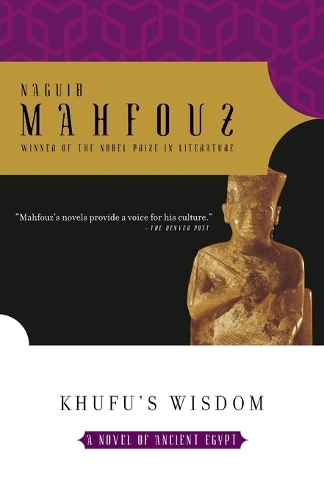
Khufu's Wisdom
(Paperback)
Publishing Details
Khufu's Wisdom
By (Author) Naguib Mahfouz
Translated by Raymond Stock
Random House USA Inc
Random House USA Inc
9th August 2005
United States
Classifications
General
Fiction
FIC
Winner of Nobel Prize 1988
Physical Properties
Paperback
240
Width 133mm, Height 201mm, Spine 16mm
201g
Description
At the center of Khufu's Wisdom, Nobel laureate Naguib Mahfouz's majestic first novel, is the legendary Fourth Dynasty monarch Khufu (Cheops), for whom the Great Pyramid of Giza was built. When a seer prophesies the end of Khufu's dynasty and the ascension to the throne of Djedefra, son of the High Priest of Ra, the pharaoh must battle to preserve his legacy against the will of the Fates. But in the face of the inexorable attraction between Djedefra and Princess Meresankh, Khufu's beautiful daughter, Khufu must consider not only his personal ambition and the opposing decree of the heavens, but also how the wisdom he prides himself on as a ruler will guide him in determining the fate of his daughter's heart. Translated by Raymond Stock
Reviews
Mahfouzs novels provide a voice for his culture. The Denver Post
Mahfouzs work is freshly nuanced and hauntingly lyrical. Los Angeles Times
What is fascinating about this refreshingly gifted writer is that his fiction is at once simple and subtle, serious and ironic, realistic and symbolic, local and universal. Naguib Mahfouz is a writer to read and admire. The Globe and Mail
His towering strength as a writer is his luminous specificity. The New York Times Book Review
Author Bio
Naguib Mahfouz was born in Cairo in 1911 and began writing when he was seventeen. His nearly forty novels and hundreds of short stories range from re-imaginings of ancient myths to subtle commentaries on contemporary Egyptian politics and culture. Of his many works, most famous is The Cairo Trilogy, consisting of Palace Walk (1956), Palace of Desire (1957), and Sugar Street (1957), which focuses on a Cairo family through three generations, from 1917 until 1952. In 1988, he was the first writer in Arabic to be awarded the Nobel Prize in Literature. He died in August 2006.
